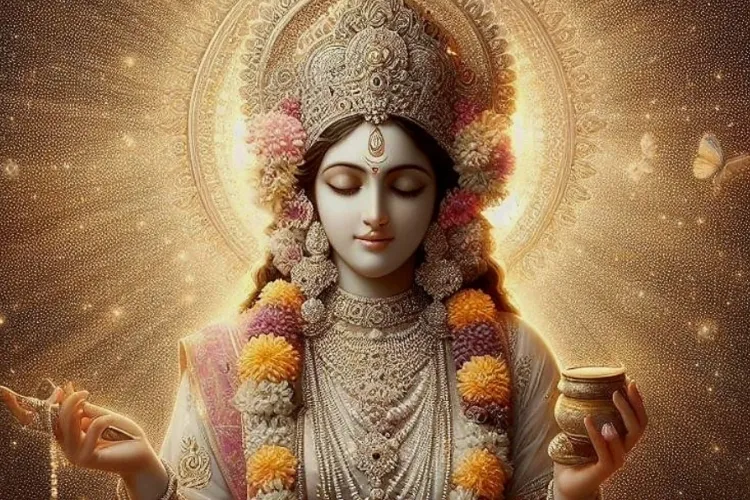
Vidushi Gaur/ New Delhi
On the second day of Navratri, devotees worship Goddess Brahmacharini, the embodiment of penance, perseverance, and unwavering devotion. Her name Brahmacharini means one who walks the path of austerity and discipline in search of the ultimate truth.
The mythological tale of this form of the Goddess goes back to her incarnation as Parvati, the daughter of King Himavan, ruler of the mountains. From a very young age, Parvati harboured a deep devotion toward Lord Shiva. Legends tell us that she was determined to marry him, despite the challenges that lay ahead. Shiva, after the loss of Sati, had renounced worldly attachments and entered a state of deep meditation. To win his love and bring him back to the world, Parvati chose the path of rigorous penance.
Parvati abandoned the luxuries of her father’s palace and entered the forests. Barefoot, with only rudraksha beads and the rosary in her hands, she gave herself to intense meditation and austerity. The tales describe her surviving only on fruits and flowers for thousands of years, then on leaves, and eventually on nothing but water and air. Her resolve never wavered, even in the face of storms, wild animals, and the cruel tests of time. Moved by her unshakable devotion and immense sacrifice, Lord Brahma appeared before her. He blessed her, declaring that her penance would not go in vain, she would indeed become the consort of Lord Shiva. Pleased with her determination and love, Lord Shiva himself accepted her devotion, and their divine union later gave rise to cosmic balance.
Thus, on this day, Goddess Brahmacharini is revered not only as the Goddess of penance but also as the symbol of strength that emerges from discipline and faith. Her image is serene: barefoot, clad in white, holding a japamala in her right hand and a kamandalu (water pot) in her left. She radiates purity, simplicity, and peace, reminding us that the greatest power often comes from inner resolve rather than external grandeur.
While the story of Goddess Brahmacharini is rooted in ancient mythology, its message carries timeless wisdom for modern life.
In today’s fast-paced world, where distractions are endless and the pressure to succeed often drives people toward shortcuts, the Goddess reminds us of the value of patience, discipline, and dedication. Just as Parvati achieved the impossible through years of tapasya, we too can overcome obstacles if we commit ourselves wholeheartedly to our goals.
Goddess Brahmacharini also teaches the strength of simplicity and contentment. She renounced material comforts to follow a higher purpose. In a society increasingly obsessed with consumerism and instant gratification, her life demonstrates that fulfillment often lies not in accumulation, but in purpose-driven living.
For students, her story is a lesson in focus, success in studies and career comes not through haste, but through steady perseverance. For professionals, it is a reminder that long-term vision outweighs short-term gains. For families, it emphasizes that relationships are nurtured not through convenience but through commitment and sacrifice.
Her message also resonates strongly in the context of mental well-being. Many struggle with anxiety, stress, and restlessness, seeking quick fixes. Goddess Brahmacharini shows that peace comes when the mind learns to quiet itself, when we cultivate patience, and when we hold on to faith even in moments of uncertainty. Her austere journey through forests parallels the inner journeys we must undertake, facing our fears, silencing doubts, and remaining steady in the pursuit of what truly matters.
In a broader sense, her story reflects the importance of faith in love and relationships. Parvati’s penance was not just about winning Shiva but about proving the strength of unconditional love. In today’s age, where relationships are often tested by ego and impatience, her example reminds us that true love is not fleeting passion but a deep, enduring commitment.
On this second day of Navratri, when lamps are lit and prayers rise in devotion, the image of Goddess Brahmacharini inspires us to pause and reflect. She is not a distant figure from mythology but a guiding presence, whispering timeless truths into our lives. She tells us that discipline is the foundation of success, faith can move even the most immovable mountains, simplicity and devotion give us inner strength far greater than wealth or power, and that love and commitment are not fragile, but unbreakable when rooted in sincerity.
READ MORE: Syed Anwar Shah turned concern for his daughter into a movement
Just as Parvati’s penance transformed her destiny, our determination and faith can transform our lives. The second day of Navratri, therefore, is not just about worship, it is about embracing the qualities of patience, devotion, and resilience in our daily journeys. Goddess Brahmacharini’s story assures us that while the path of discipline may be difficult, its rewards are profound, leading us closer not just to divine blessings, but to the best version of ourselves.
